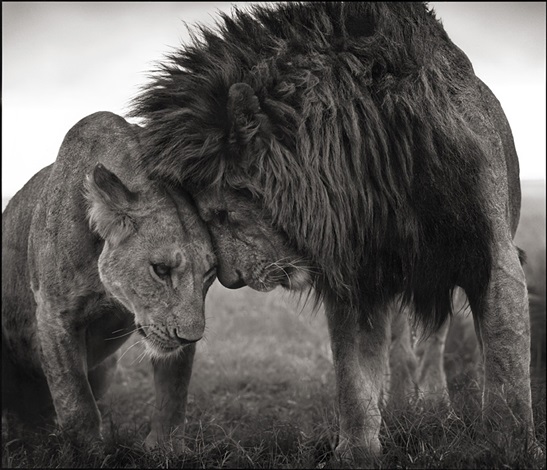Africa
1.) While I was reading, I thought that the photographer was very smart when shooting. Nick said that he didn't like shooting from far away and zooming in because it isn't natural. He compared it to taking someone's portrait from a hundred yards away, it wouldn't make sense. Looking at the pictures, I felt like I was there, and I could almost feel the elephant's sadness, being that they are getting killed rapidly.
2.)

3.) The photo above is of a lion and lioness resting their heads on one another. They look to be in sorrow. This is my favorite picture because it shows how the pair rely on each other, even though the male lion is seen as the alpha.
4.) A rule of photography that is seen in this photo is balance. The lions' heads are going from the top of the picture to a lower part of the picture, and the lighting is balanced from dark around the edges and lighter in the center. Another rule used in this picture is simplicity, because it's just focused on the lions, there is nothing behind them that greatly adds to the picture.
5.) The camera that Nick Brandt uses is the Pentax 67II, and he only used two fixed lenses. He took pictures on medium-format black and white film. He doesn't use telephoto or zoom lenses, and his reasoning for that is, "You wouldn't take a portrait of a human being from a hundred feet away and expect to capture their spirit; you'd move in close." He doesn't use those lenses because it's harder to capture the animals' feelings from so far away.
6.) His reasoning for taking these photos is to raise awareness about the rapidly decreasing African animal population. He wants to capture the animals in the state of "Being", meaning that he wants to capture them when they are still alive, before they die off in the wild.
7.) His hope in taking these photos is for people to recognize what is happening in Africa. There is so much illegal hunting going on in Africa and the population of elephants, hippos, rhinos, lions, cheetahs, and many more is decreasing too fast. He wants to persuade people to want to help the animals survive.
8.) In his book, On This Earth, A Shadow Falls Across the Ravaged Land, Nick says, "We are living through the antithesis of genesis right now. It took billions of years to reach a place of such wondrous diversity, and then in just a few shockingly short years, an infinitesimal pinprick of time, to annihilate that."
2.)

3.) The photo above is of a lion and lioness resting their heads on one another. They look to be in sorrow. This is my favorite picture because it shows how the pair rely on each other, even though the male lion is seen as the alpha.
4.) A rule of photography that is seen in this photo is balance. The lions' heads are going from the top of the picture to a lower part of the picture, and the lighting is balanced from dark around the edges and lighter in the center. Another rule used in this picture is simplicity, because it's just focused on the lions, there is nothing behind them that greatly adds to the picture.
5.) The camera that Nick Brandt uses is the Pentax 67II, and he only used two fixed lenses. He took pictures on medium-format black and white film. He doesn't use telephoto or zoom lenses, and his reasoning for that is, "You wouldn't take a portrait of a human being from a hundred feet away and expect to capture their spirit; you'd move in close." He doesn't use those lenses because it's harder to capture the animals' feelings from so far away.
6.) His reasoning for taking these photos is to raise awareness about the rapidly decreasing African animal population. He wants to capture the animals in the state of "Being", meaning that he wants to capture them when they are still alive, before they die off in the wild.
7.) His hope in taking these photos is for people to recognize what is happening in Africa. There is so much illegal hunting going on in Africa and the population of elephants, hippos, rhinos, lions, cheetahs, and many more is decreasing too fast. He wants to persuade people to want to help the animals survive.
8.) In his book, On This Earth, A Shadow Falls Across the Ravaged Land, Nick says, "We are living through the antithesis of genesis right now. It took billions of years to reach a place of such wondrous diversity, and then in just a few shockingly short years, an infinitesimal pinprick of time, to annihilate that."

Comments
Post a Comment